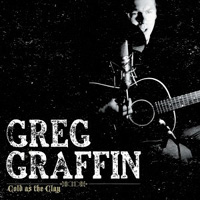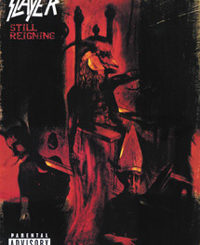 Greg Graffin
Greg Graffin
Cold as the Clay (Anti-)
by Tim Den
It was no surprise to me, even back when he released his debut solo album as American Lesion (1996), that Bad Religion vocalist Greg Graffin would itch to put forth music that sounded nothing like his main band. Well, sonically anyway… If you’ve got ears at all, you would’ve noticed long ago (around the time of Into the Unknown, even) that Graffin has always utilized traditional folk – be it American or Irish – chord progressions and melodic lines to drive his compositions. Even as power chords, the cyclical pattern that they clung onto meant that they were written as acoustic songs, capable of being performed slow and stripped down as well as fast and furious. But not everyone pays attention to the details, right? So for those who’re only aware of speed and distortion, Cold as the Clay frames the silk-smooth vocalist’s über melodic delivery in old timey instrumentation and folk surroundings, allowing Graffin’s (as always) ingenious hooks to breathe in the open spaces and appropriate accompaniment. Joined by the likes of banjo, mandolin, fiddle, and piano, the songs (in Graffin’s own words) “depict timeless snapshots of American life” as only his can: With affecting, everyman vulnerability and universality, not to mention ace melodies. Even when he takes on old-time traditionals – of which there are many on Cold as the Clay – his trademark rock-solid pitch and heart-wrenching weaves-and-turns bring out a new shade of depth in the time-tested hymns. The chorus of “Talk About Suffering,” for example, trembles with emotion as Graffin and guest vocalist Jolie Holland quiver the words “father/mother/brothers” to great effect. As Graffin states, it truly resonates with the “pastoral ideals” of “our modern-day complexity.”
But it’s the originals here that really prove, once again, why he is a beloved singer/songwriter, regardless of genre. “Don’t Be Afraid to Run,” “The Watchmaker’s Dial,” and especially the title track strike into your soul as if you’re being awoken by melody for the first time. They embody the crossroads between the folk traditions that Graffin is so obviously influenced by, and a certain 21st century weariness that, somehow, is only amplified in such a reflective musical setting. Have we strayed too far? Not enough? As the human species continue on its way toward who-knows-what, one thing is certain: The sounds on Cold as the Clay will ring a bell in all of us whose past includes the folk tradition.
(www.anti.com)



